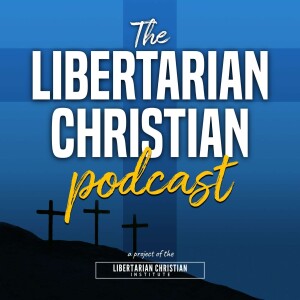
The Libertarian Christian Podcast
Religion & Spirituality:Christianity

Ep 332: Biblical Interpretation, Libertarianism, and the Dangers of Christian Nationalism, with Matt Whitman
 2023-06-23
2023-06-23
In this episode of the Libertarian Christian Podcast, our guest is Matt Whitman, who hosts the 10-Minute Bible Hour and the Ironwood Rhino podcasts. He is a classical liberal, an ordained minister, and a committed husband and father. He's a student of History and the Humanities. He's also the co-host of No Dumb Questions, where he and Destin Sanlon, the other host and creator of the Smarter Every Day YouTube channel, discuss their different views on a wide range of topics, from science and engineering to our current connection with history.
They begin by discussing the history of the relationship between the individual and the collective in different nations. Matt talks about how ancient civilizations built upon one another but ultimately had oppressive regimes, while the Persians realized that citizens’ devotion was expedient for the service of the great king and therefore stressed the importance of tolerance. The Romans introduced a legal standard to ensure tolerance where they thought possible and the authority of the state where desired to keep control. However, Whitman argues that Persia has been misunderstood as an Eastern power when it was a forward-thinking culture that had a significant impact when it came into contact with Greece.
The two then address the Bible's passages, such as Romans 13, that seem to advocate for submitting to the government's authority, arguing that a negative hermeneutic should be used to understand these passages in context with the rest of the Bible. They also discuss Paul's letter to the Roman church and how he cleverly wrote about the ideal government.
The idea of Christian nationalism is discussed, as well as the dangers of mingling state power with faith. Both Matts believe in a more voluntary role for the state in promoting justice. They also discuss the dangers of using authoritarian tactics to combat authoritarianism, citing historical and biblical lessons.
Whitman shares his personal journey from Christianity to atheism and back to Christianity, explaining that it was based on philosophical and epistemological reasons, rather than anger towards God or others. He then emphasizes the importance of patience and tolerance in one's personal life and in politics as a libertarian. The discussion concludes with a discussion of Whitman's work visiting churches and attempting to bring people together.
Audio Production by Podsworth Media - https://podsworth.com
More Episodes
Create your
podcast in
minutes
- Full-featured podcast site
- Unlimited storage and bandwidth
- Comprehensive podcast stats
- Distribute to Apple Podcasts, Spotify, and more
- Make money with your podcast
It is Free
- Privacy Policy
- Cookie Policy
- Terms of Use
- Consent Preferences
- Copyright © 2015-2024 Podbean.com





